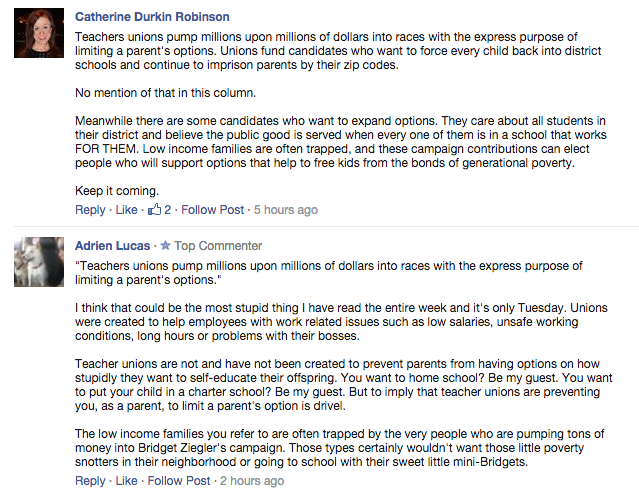Friday Freakout: Denying Teachers’ Unions Actions Against Parent Options
Teachers’ unions represent some of our most respected community members—an undeniable truth. So too can it be said that unions sometimes work to block school choice programs. One commenter, whose overall opinion on the matter is shared by many, disagrees in today’s freakout, from the Florida Herald-Tribune’s “School Board race sees influx of dollars.”

In addition to “help(ing) employees with work related issues such as low salaries, unsafe working conditions, long hours or problems with their bosses,” teachers’ unions and their affiliates actually dotry “to prevent parents from having (educational) options.” And there’s evidence to prove it.
Teachers’ unions have appeared as plaintiffs in various lawsuits intended to shut down school choice programs—including in Alabama, Arizona, Illinois, Indiana, Louisiana, and Adrien Lucas’ state, Florida.
In Florida, plaintiffs—including the Florida Education Association (FEA), the state’s teachers’ union—are suing to stop a 13-year-old tax-credit scholarship program, the sole purpose of which is to give parents more schooling options. In fact, it is presently serving more than 67,000 students, 76 percent of whom are children of color.
Another current, high-profile lawsuit intended to prevent parents from having options, not too far from Florida, also has union ties:
North Carolina: Hart v. State of North Carolina and Richardson v. State of North Carolina
- A voucher program open exclusively to families who qualify for the free and reduced-price lunch program.
- Plaintiffs: 25 residents all of whom are either public school employees, public school board of education members, or affiliates of public education networks and The North Carolina Association of Educators (NCAE). The NCAE cannot technically call itself a teachers’ union, but its mission statement reads as follows: “to be the voice of educators in North Carolina that unites, organizes and empowers members to be advocates for education professionals, public education and children.”
Adrien Lucas said, “Teachers unions are not and have not been created to prevent parents from having options.,” and she’s right. But they have become that.
The National Education Association—the mother organization of the FEA that also lists the NCEA as an affiliate—has officially stated, the “NEA opposes school vouchers…and oppose alternatives that divert attention, energy, and resources from efforts to reduce class size, enhance teacher quality, and provide every student with books, computers, and safe and orderly schools.” While all of those things sound great, many students’ needs fall outside the NEA’s short list.
Further, the American Federation of Teachers, one of the largest national teachers’ unions, also has officially stated “that the AFT and its affiliates continue to work to defeat voucher(s)….”
Those are statements from the two largest teachers’ unions saying they will “oppose” and “defeat” efforts that give parents’ access to learning options outside traditional public schools.
Ms. Lucas went on to say, “The low income families you refer to are often trapped by the very people who are pumping tons of money into Bridget Ziegler’s campaign. Those types certainly wouldn’t want those little poverty snotters in their neighborhood or going to school with their sweet little mini-Bridgets.”
On one hand, it’s difficult to know exactly how she thinks people supporting pro-school choice candidates are trapping low-income families. On the other, we do know Florida’s tax-credit scholarship program serves only low-income households and children in foster care by enabling them step outside their ZIP Code-assignment for other learning opportunities. We also know the average participating student’s household in Florida’s tax-credit scholarship program earns $24,067 per year, which is just 4.5 percent above the poverty line.
And though it is highly likely some or many wealthy individuals support pro-school choice candidates, we also know some wealthy individuals as well as teachers’ unions spend money to oppose pro-school choice candidates and/or support anti-school choice candidates.
According to U.S. Department of Labor reports, the AFT—which, again, “work(s) to defeat voucher(s)”—spent $32 million on political lobbying activities and contributions to like-minded special interest groups in 2012-13. So far this year, the NEA and its affiliates have spent nearly $9 million in contributions to candidates, political action groups, political parties, committees, and other special-interest groups.
That said, teachers’ unions have every right to fight for their members’ interests, just as school choice supporters spend money to advance their mission. But to claim they aren’t actively fighting to take away existing options and to limit people’s access to more non-traditional options is—to use Ms. Lucas’s own words—“drivel.”




